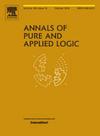Metric spaces in choiceless set theory
IF 0.6
2区 数学
Q2 LOGIC
引用次数: 0
Abstract
We answer open questions from Keremedis (2016) [12] and Keremedis and Tachtsis (2022) [16], and properly strengthen some results from the above papers as well as from Keremedis et al. (2023) [19]. In particular, and among other results, we establish the following:
- 1.The Boolean Prime Ideal Theorem does not imply “For every sequentially compact metric space , ” in ZF (Zermelo–Fraenkel set theory without the Axiom of Choice (AC)).
- 2.“Every linearly ordered set can be well ordered” ∧ “The union of a well-orderable family of well-orderable sets is well orderable” ∧ “For every uncountable sequentially compact metric space , ” does not imply the Axiom of Countable Choice in ZFA (ZF with atoms).
- 3.“For every uncountable compact metric space , ” does not imply “For every uncountable sequentially compact metric space , ” in ZFA”.
- 4.“For every uncountable sequentially compact metric space ” does not imply “For every uncountable compact metric space , ” in ZFA.
- 5.“For every uncountable sequentially compact metric space ” does not imply the Axiom of Countable Multiple Choice for countable sets () in ZFA.
- 6.“Every linearly ordered set can be well ordered” does not imply “Every infinite compact metric space has an infinite scattered subspace” ∨ “Axiom of Countable Choice for finite sets” in ZFA.
We also address the open problem of the deductive strength of Stone's Theorem “Every metric space is paracompact” (ST) and provide a non-trivial partial answer to the open question whether ST implies . In particular, we show that the formally weaker statement “For every metric space , or is paracompact” does not imply in ZFA. We also show that, for every uncountable regular cardinal κ, the above formally weaker form of ST is not implied by “For all infinite well-ordered cardinals , the Principle of Dependent Choices for λ holds” in ZF.
无选择集合论中的度量空间
我们回答了Keremedis(2016)[12]和Keremedis and Tachtsis(2022)[19]的开放性问题,并适当加强了上述论文以及Keremedis等人(2023)[19]的一些结果。特别地,在其他结果中,我们确立了以下几点:在ZF (Zermelo-Fraenkel集合论,无选择公理(AC)).2中,布尔素数理想定理并不意味着“对于每一个序紧度量空间< X,d >, |X|≤2¹0”。“每个线性有序集都可以良序”∧良序集族的并是良序的“∧”对于每一个不可数序紧度量空间< X,d >, |X|=2¹0”并不意味着ZFA(含原子的ZF)中的可数选择公理。“对于每一个不可数紧度量空间< X,d >, |X|≥2¹0”并不意味着在ZFA中“对于每一个不可数连续紧度量空间< X,d >, |X|≥2¹0”。ZFA.5中的“对于每一个不可数连续紧度量空间< X,d > |X|≥2¹0”并不意味着“对于每一个不可数紧度量空间< X,d >, |X|=2¹0”。“对于每一个不可数序紧度量空间< X,d > |X|≥2 ^ 0”并不蕴涵ZFA.6中可数集的可数选择公理(CMCω)。“每一个线性有序的集合都是良序的”并不意味着ZFA中的“有限集合的可数选择公理”∨“每一个无限紧度量空间都有一个无限分散的子空间”。我们还讨论了斯通定理“每个度量空间都是准紧的”(ST)的演绎强度的开放问题,并提供了ST是否意味着CMCω的非平凡部分答案。特别地,我们证明了形式上较弱的命题“对于每一个度量空间< X,d >, |X|≥2 ^ 0或< X,d >是准紧的”并不意味着在ZFA中有CMCω。我们还证明,对于每一个不可数正则基数κ,在ZF中的“for all infinite良序基数λ<;κ, the Principle of Dependent Choices for λ成立”并不隐含上述ST的弱形式。
本文章由计算机程序翻译,如有差异,请以英文原文为准。
求助全文
约1分钟内获得全文
求助全文
来源期刊
CiteScore
1.40
自引率
12.50%
发文量
78
审稿时长
200 days
期刊介绍:
The journal Annals of Pure and Applied Logic publishes high quality papers in all areas of mathematical logic as well as applications of logic in mathematics, in theoretical computer science and in other related disciplines. All submissions to the journal should be mathematically correct, well written (preferably in English)and contain relevant new results that are of significant interest to a substantial number of logicians. The journal also considers submissions that are somewhat too long to be published by other journals while being too short to form a separate memoir provided that they are of particular outstanding quality and broad interest. In addition, Annals of Pure and Applied Logic occasionally publishes special issues of selected papers from well-chosen conferences in pure and applied logic.

 求助内容:
求助内容: 应助结果提醒方式:
应助结果提醒方式:


